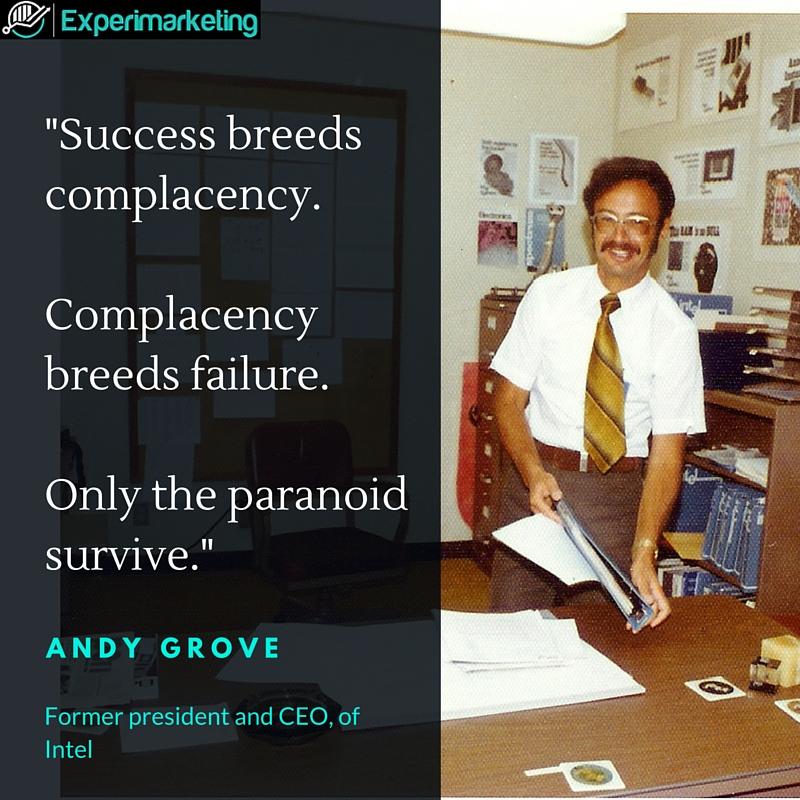A brilliant engineer, former Intel president Andy Grove has been dubbed by business historians as “the guy who drove the growth phase” of Silicon Valley. The famously immodest Steve Jobs idolized Grove and called on him for advice when he was starting Apple.
Grove became the go-to expert on the management of electronics companies, famously advising:
Only the paranoid survive.
Grove’s early life
Andrew Stephen (“Andy”) Grove was born in Hungary in 1936 to Jewish parents who gave him the birth name András István Gróf. At the age of four, just before the Nazi invasion, Grove contracted scarlet fever, which nearly killed him and left him partially deaf.
In order to survive the Nazi occupation, Grove and his mother lived under false names, sheltered by friends, but Grove’s father was sent to a labor camp in Eastern Europe.
All three Groves survived the war, but had to flee Hungary for Austria in 1956 after the Soviet Union cracked down on the relatively liberal Hungarian Communist government.
Grove notes in his memoirs:
“By the time I was twenty, I had lived through a Hungarian Fascist dictatorship, German military occupation, the Nazis’ ‘Final Solution,’ the siege of Budapest by the Soviet Red Army, a period of chaotic democracy in the years immediately after the war, a variety of repressive Communist regimes, and a popular uprising that was put down at gunpoint. . . Many young people were killed; countless others were interned. Some two hundred thousand Hungarians escaped to the West. I was one of them.”
Grove arrives in the USA
In 1957, Grove arrived in New York City and took a job as a busboy in a restaurant where he met his future wife, another Hungarian refugee who was working as a waitress.
Grove managed to earn a degree in chemical engineering at the City College of New York in just three years while simultaneously working at the restaurant and courting his wife. He gained his PhD from the University of California at Berkeley just three years later.
Grove’s scientific expertise enabled him to become an early expert in integrated circuits, a technology without which the microcomputers in our desktop PCs, laptops, and cell phones would not function. In 1967 he and another Hungarian refugee, Leslie Vadász, became the first two employees of a newly formed company known as Intel.
The growth of Intel
Intel initially made memory chips, but when Japanese competitors began dumping memory chips on the American market Grove led Intel’s transition to becoming a premier producer of microprocessors. Intel’s revenues grew from just $2,627 in 1967 to $20.8 billion in 1997.
During Grove’s tenure as CEO of the company, its market capitalization grew from $4 billion to $197 billion. Beginning with 2 employees, the company now has 108,000.
Grove’s success formula
What are the principles that Grove sees as driving his business success? Andy Grove’s formula goes something like this:
Smart actions lead to success, but success breeds complacency. Complacency breeds failure, so constant innovation is a necessity. Only the paranoid survive.
To avoid complacency’s creeping into the Intel business culture, Grove famously encouraged employees to speak their minds. Grove called the process “creative confrontation.”
It was not enough for Intel to have a magic moment of creativity like the one experienced by Hewlett and Packard when they built their first audio oscillator in a garage. Working out the details of design, scaling projects for affordable production, building factories, recruiting marketers, and keeping employees happy take more than a few moments of peak inspiration.
Lessons from Intel
Grove also applies his principles to issues that did not face his company in the 1960’s and 1970’s. He counsels that diversity in the workplace requires long-term commitment. It is not enough to hire people from diverse backgrounds to enrich the creative culture. Those people have to feel at home.
Grove also applies his principles to the challenge of job creation at a national level. Countless economists and government officials have advised companies to send manufacturing outside the company’s home country and to keep knowledge work at home. Grove argues that the chain of experience from the manufacturing floor to the executive offices is broken when jobs are sent abroad, and that the only way to innovate is to keep all the people responsible for the company’s success in constant contact.

Only the paranoid survive
Engineers are known for their ability to focus on problems. Grove tells engineers that they need to be on the lookout for problems they do not yet see. A healthy dose of paranoia is necessary to survive, and to thrive, in a complex and constantly changing competitive environment.
24 Marketing Lessons from 24 Business Leaders
Download now for free
[contact-form-7 id=”7875″ title=”Simple email lead magnet”]
